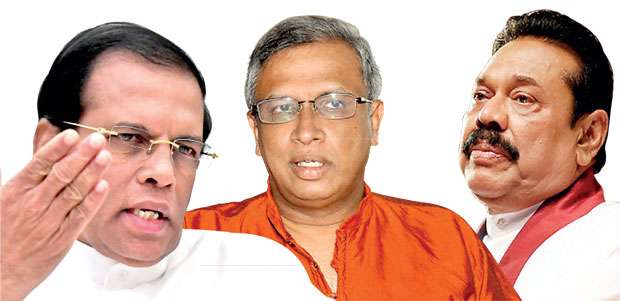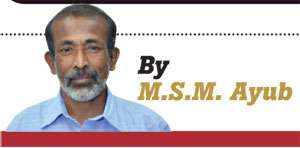Reply To:
Name - Reply Comment

 oliticians seem to deem that they have solved all economic issues faced by the people or addressing economic issues is not any of their responsibilities. Their main focus is centered on how to capture power or remain in or retain power. They all are agog with political issues such as elections and Constitutional changes.
oliticians seem to deem that they have solved all economic issues faced by the people or addressing economic issues is not any of their responsibilities. Their main focus is centered on how to capture power or remain in or retain power. They all are agog with political issues such as elections and Constitutional changes.
Sometimes they come up with economic plans or strategies, but with the motive of plundering public funds or showcasing them at future elections and hoodwink the public or both.
After coming out of the recent political and Constitutional woods the main focus of the southern politicians is now on various elections, especially the provincial councils that have been repeatedly postponed citing various pretexts- legal or technical. The UPFA which is nominally headed by President Maithripala Sirisena and practically by Opposition Leader Mahinda Rajapaksa meanwhile is attempting to push the government towards an early Parliamentary election whereas the UNF prefers a Presidential election.
the UNF prefers a Presidential election.
Tamil political parties, especially the main Tamil coalition, Tamil National Alliance (TNA) is obsessed with a new Constitution that would address the Tamils’ political aspirations. There was a time when the TNA has been telling the Tamil people each year that a political solution to the ethnic problem would be reached before the “next” Thai- Pongal Day which normally falls on January 15. For the past three years it has been promising the Tamils a new Constitution with a federal form of governance and with various time frames.
"Sumanthiran’s claim has become fodder for the Rajapaksa camp which always prefers to find a Tamil bogey
This invited a barrage of criticisms from both the Tamil and Sinhalese extremist forces
The debate on Aekeeya rajyaya and the Orumittha Nadu accordingly had faded away"
The latest promise has been given by TNA spokesman, Parliamentarian M.A. Sumanthiran. He has told recently that a new Constitution would be introduced before February 4, the country’s Independence Day. It is not clear whether it is the presentation of a new draft Constitution in Parliament or the adoption of a new Constitution that he had meant to do before February 4. Whatever he had meant, reports said that Prime Minister Ranil Wickremesinghe was to present a report on a draft Constitution today.
However, before that Sumanthiran’s claim has become fodder for the Rajapaksa camp which always prefers to find a Tamil bogey. They are claiming that government with the TNA is going to bring in a federal constitution which ultimately would divide the country.
At the beginning of the so-called Yahapalana government or in 2015, a new Constitution seemed to be a possibility. It was a time when those who voted for the 18th Amendment to the Constitution were brought to their knees and compelled them to vote for the 19th Amendment. In other words it was a time when those who voted for the abolition of independent commissions in order to strengthen the hands of the executive president were compelled to vote for the reinstitution of the independent commissions in a manner that curbed the powers of the President to an unprecedented level, which we witnessed during the recent Constitutional crisis.
"Tamil political parties, especially the main Tamil coalition, Tamil National Alliance (TNA) is obsessed with a new Constitution that would address the Tamils’ political aspirations"
Also, almost all political parties in Parliament had agreed to bring in a new Constitution and to participate in the government’s mechanism for that purpose. Despite Rajapaksa clan not having much enthusiasm in the process and there having been some reservations on the composition of the Lal Wijenayake committee that gathered public views on the proposed new Constitution, all parties in Parliament participated in the process.
Thus, the whole Parliament was converted into a Constitutional Assembly in January, 2016. Six sub-committees were appointed under the Constitutional Assembly to look into the proposals involving various sectors concerning the Constitution. Members of the Joint Opposition led by former President Mahinda Rajapaksa too participated in them.
The sub-committees handed over their report to the Steering Committee headed by Prime Minister Ranil Wickremesinghe which had been entrusted the drafting of a new Constitution in November, 2016. Until then, there seemed to be a possibility of replacing of the current Constitution with another. During the first half of 2017, with the agitations by Rajapaksa loyalists against the UNP led government heightening, the Joint Opposition withdrew from the Constitution making process. That marked the beginning of the end of that process and the results of the local government elections in February last year was also a body blow to it, as the SLFP members in the government started to find ways to side with Rajapaksa camp.
"In fact, the UPFA is not a party against federalism. This was the party once between 1994 and 2001 ruled the country under the name of People’s Alliance (PA) under President Chandrika Kumaratunga"
Then came the interim report of the Steering Committee which was presented in parliament in September, 2017. At a time when the Rajapaksa loyalists were finding ammunitions, especially racist slogans to attack the government the report which contained contradictory proposals on ethnically sensitive issues might have been a godsend to them. The report suggested to call Sri Lanka an “Aekeeya rajyaya” in Sinhala which means “unitary state” and “Orumittha Nadu” in Tamil which can also mean “united”.
This invited a barrage of criticisms from both the Tamil and Sinhalese extremist forces. Interestingly, neither side had any issue with the power devolution arrangement proposed by the interim report; rather they were at odds with the sign board in the language of the “other.” This fact points as to how shallow their thinking was and how hollow their agitations were.
However, the political upheavals that engulfed the country beginning with the local government election in February last year and ran throughout the year overshadowed the Constitutional discourse. The debate on Aekeeya rajyaya and the Orumittha Nadu accordingly had faded away.
Even if the steering committee has presented a draft Constitution, it would be a non-starter, given the composition of the current Parliament. Now that the Maithri faction of the United Peoples Freedom Alliance (UPFA) has united with the Mahinda faction of the party, making a 95 member group in Parliament, the possibility of adopting a Constitutional amendment or a new draft Constitution with two thirds of majority votes is extremely remote. Sumanthiran knows this very well.
Rajapaksa camp also knows it. But they also do not want to waste the ammunition supplied by Sumanthiran. Thus, they are creating a huge hue and cry over TNA spokesman’s statement.
"Rajapaksa camp also knows it. But they also do not want to waste the ammunition supplied by Sumanthiran. Thus, they are creating a huge hue and cry over TNA spokesman’s statement"
In fact, the UPFA is not a party against federalism. This was the party once between 1994 and 2001 ruled the country under the name of People’s Alliance (PA) under President Chandrika Kumaratunga. The PA government presented four federal formulas – in 1995, 1996, 1997 and in 2000 -as Constitutional amendments. In none of those documents Sri Lanka was described as a Unitary State, rather it was called a Union of Regions. Interestingly, the architect of all these federal solutions was none other than the Chairman of the Sri Lanka Podujana Peramuna (SLPP), Professor G.L.Peiris. Since he led the UNF government’s negotiating team that agreed with the LTTE to explore a solution to the ethnic problem under a federal system in December 2002 in Oslo, he has the credit in spearheading the struggle for a federal system in Sri Lanka under both the SLFP and the UNP.